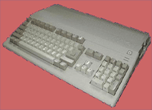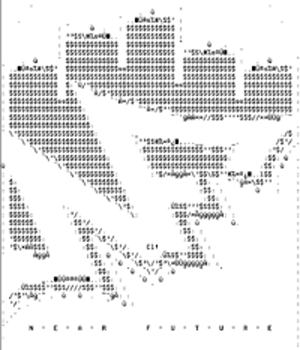Initially, the artistic means of producing a demo
were limited by the PC systems used back in the days (Apple II or C64).
Disk space as much as processor power were rare goods, graphical
capacities as shortened as sound features. The scene soon developed a
self-conception that in reverse made these limitations the core challenge
of their work. Consequently, the scene made up its own ethics, acting on
the maxim of exhausting the given ressiources as much as possible.

The goal of demo programmers thus became the claim to make
something out of almost nothing (or at least very few). No doubt that
until now, this pretension implies a high level of technical competency
and creativity among the programmers, musicians and visual artists.
Smartness instead of pure machine power - this basic principle
turned out to be the dominating target. New effects were to be created by
using one´s own fantasy - no supermodern programmes, powerful computers or
higher memory capacities. "Restriction" is the main term for this approach
- even the coming up of new, better computers did not lower the people´s
respect for this rule. Facing a prodigal amount of modern, easy-to-use
hard- and software nowadays, the "restrictions" have become a principle
that by means of its strictness and consequence literally forces the
creativity out of the programmers.

Oldschool demos are an excellent example for the
functionality of these restrictions. According to the oldschool scene´s
philosophy, pure manual (and mental) work are the crucial attribute for a
good demo: modern software like demo editors (a sort of contruction kit
for demos) narrows the programmer´s achievement. Even methods like mp3 are
not considered morally correct but a cheap way to get a neat soundtrack.
On the contrary, some musicians still compose their tracks note by note
and, by superimposing different levels, try to generate complex and
astonishing sound structures. Assuming all the aspects that the oldschool
scene´s philosophy consideres in its work, one could say that in fact, a
good programmer (or musician or graphic designer) qualifies inversely
proportional to the ressources he uses.
Yet, the restrictions
include further aspects: the use of service programmes is prohibited and
the disk space occupied by a demo is defined. Categories start at 1 KByte
and continue at 4 KB, 64 KB, 256 KB up to the "wilddemos" which are
subject to no restrictions at all. Other "restrictions", even if this
might no be the right term, are the choice of exceptional platforms:
handheld computers, organizer, game consoles or mobile phones can all be
used to play demos on. Here, the attraction is the same: showing the
people that anything is possible, even on this device.

